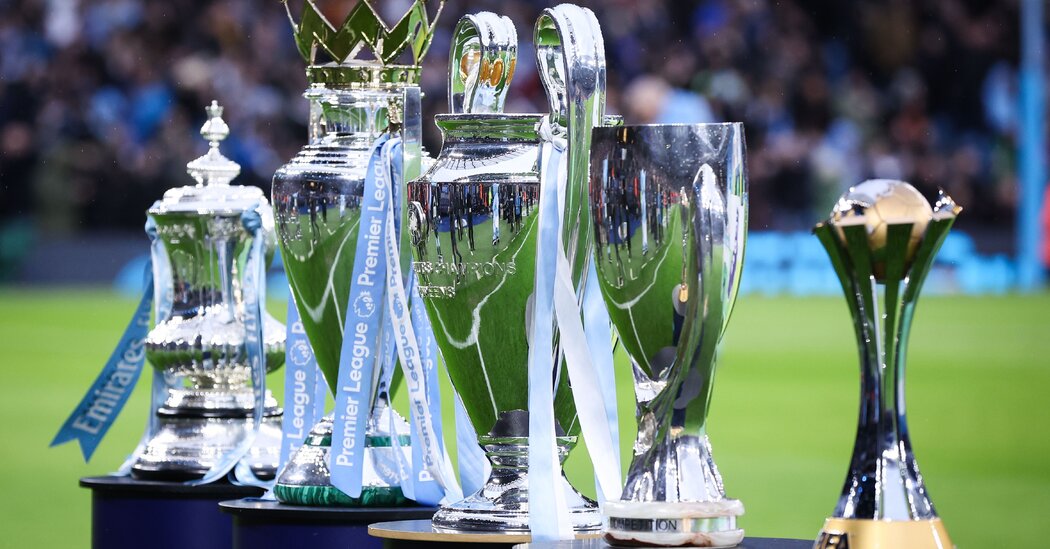Silence swept from one end of the Etihad Stadium to the other, a wave of dawning realization. The background noise that a crowd cannot help but generate — the rumble and murmur of 20,000 separate conversations — fell away. Calculations were made. Conclusions were drawn.
For most of Wednesday evening, the natural operating assumption was that Manchester City would advance past Real Madrid and reach yet another Champions League semifinal. Pep Guardiola’s City team was creating so many chances that victory felt, really, like a statistical inevitability. Even as the tied game ticked into extra time, the match felt strangely nerveless. City went close with a chance again. No matter. The next one would be along soon.
The idea that any other ending was available did not seem to have occurred to anyone, right up to the point when Bernardo Silva and Mateo Kovacic missed their penalties in quick succession, and all of a sudden City found itself on the brink. The possibility of elimination had felt so far-fetched that its arrival almost came as a surprise.
A moment later, Antonio Rüdiger was hurling himself, topless, into a morass of delirious Real Madrid fans. Jude Bellingham was leading chants in his second language. And Guardiola’s hopes of retaining the Champions League trophy had been dashed. He stood in the center circle, looking just a little lost. “What more could we have done?” he would ask later.
It has felt for a while as if Manchester City has achieved so much, so fast, that it has had to start inventing challenges to meet. Can Guardiola win titles without a striker? Yes. What about with central defenders who are actually midfielders? Also yes. Can he craft a team capable of collecting 100 points, or winning every domestic trophy, or doing a treble? Yes, yes, yes.
The grand ambition for this season was the inevitable next step. City, it turned out, was pursuing the double treble, a phrase that does not appear to have entered soccer’s lexicon before this year. That, alas, is now over. City may have to make do instead with the bitter solace of becoming the first team in history to win the English title four years in a row. Oh, and winning the F.A. Cup.
This, of course, is precisely what City’s owners in Abu Dhabi set out to do when they first invested in the club 16 years ago. The aim was always to create a team so successful, so polished and so flawless that merely winning English soccer’s once fabled double would come to be seen as something of an anticlimax.
And yet, right from the start, it was also possible to wonder if there had been a bit of a misunderstanding. The reward for that sort of dominance in soccer is not universal applause and widespread affection. Yes, of course, winning more trophies means winning more fans. But it also, traditionally, means making more enemies.
That, certainly, is the experience of English soccer’s previous superpowers. Arsenal, Liverpool and Manchester United all owe their global fan bases to historical periods of dominance, but they can trace the enmity they inspire in almost everyone else to much the same thing. It was worth it for them, of course; their global ambitions extended no further than selling jerseys.
City’s benefactors, on the other hand, had a rather more complex set of motivations. Abu Dhabi did not buy the club because Sheikh Mansour bin Zayed al-Nahyan was just really into soccer. It was a marketing play, a real estate play, an economic play, a mechanism to win global influence.
But it all rested, to a greater or lesser extent, on City’s winning. Mediocrity does not attract investors to your diversified economy or counteract suggestions that your human rights record might be suboptimal. There are no hearts and minds in 12th place. The Manchester City project would only work if the club became a beacon of excellence.
That is, of course, precisely what has happened. Abu Dhabi has spent lavishly on players, infrastructure and executives. (During the penalty shootout on Wednesday, City’s coaching staff and substitutes lined up on the sideline in solidarity: There were 40 of them.)
City’s ownership group has overturned every convention, disregarded every cost, pushed every boundary. (It has also not always been especially concerned with following the rules, the Premier League has charged.) It has built a globe-spanning, multiclub network. It hired Guardiola, the standout coach of his generation, and transformed the club to his exact specifications.
It has worked. City, as its own club-approved slogan goes, is the “best team in the land and all of the world.” It has the trophies to prove it. But, curiously, it does not have the hatred. For a hegemon, City does not seem to inspire much animosity. There is certainly no equivalent to the Anyone But United movement that was briefly, and admittedly a little bitterly, popular around the turn of the century.
The kindest explanation for this is that the style of play inculcated by Guardiola is so smooth, inventive and captivating that it is impossible to dislike. Leaving aside that this greatly overestimates the amount of rationality in soccer, it does not ring true: Alex Ferguson’s Manchester United teams also played thrilling soccer. And everyone hated them.
More convincing is the idea that, perhaps subconsciously, fans of all but City’s direct rivals understand that the club is not subject to the same rules as everyone else.
Not in the sense that City will at some point have to disprove the 115 charges of breaching the Premier League’s financial rules that have hung over it for more than a year, but in the sense that it is somehow unlike other clubs: clean and smooth, designed with scientific precision and functionally bottomless resources. City exists in a world apart.
This sentiment was captured perfectly by Dario Minden, a spokesman for Unsere Kurve, a sort of umbrella group for Germany’s organized fans, as he tried to explain why — in a way — it was almost better for Bayern Munich to win the Bundesliga, rather than anyone else.
Bayern also has a colossal financial edge, of course. It, too, seems to German fans to be a different animal compared with everyone else. “If Bayern wins it,” Minden, an Eintracht Frankfurt fan, said, “it is almost like nobody does.” The success of a direct rival, of a comparable peer, can sting, but there is no point in wondering why the lottery winner has a nicer house than you do.
Even this understanding, though, feels as though it might be incomplete. Last week, Barney Ronay suggested in The Guardian that the feats of Lionel Messi and Cristiano Ronaldo had changed the standard by which we judge players. So consistent is their excellence, he wrote, that a single bad game is enough to subject their successors to charges of being frauds.
City, perhaps, has similarly changed the way we judge clubs. Guardiola’s team has not lost any of its last 28 games. (Defeat on penalties, spiritually if not technically, does not count.) Rodri, its central midfielder, has not lost a game in City colors in more than a year. Neither of these things are normal.
But Guardiola and his players have made such a habit of these sorts of feats that, like Messi and Ronaldo, they have shifted our expectations of what it takes to win a championship, of what it means to be “good.” In doing so, they have changed — raised — the standard to which everyone else is held.
And so when Arsenal or Liverpool or whoever else falls short, the focus tends to be on their supposed flaws, rather than the unassailability of City’s position. There is no chance to foster a new hatred — not when there are old ones to sustain.
Over the next few weeks, in spite of the defeat to Real Madrid, Manchester City will most likely record yet another double, claim yet another piece of history, set yet another high bar. Its fans will understandably celebrate, and the fans of its vanquished opponents will mourn. For the majority, though, it would seem that the wave of realization is yet to break.
The Select Few
And so, finally, the tournament the world has been waiting for begins to take shape. No, not that one. Nor that one. This one is the expanded FIFA Club World Cup that is set to be held, like all other major soccer tournaments, in the United States in 2025.
Strictly speaking, as a journalist in his early 40s, I should be vehemently opposed to the concept of an expanded FIFA Club World Cup. The fact that the idea for it came from Gianni Infantino, for example, is generally a red flag. And there is one very obvious problem with it: The vast sums of money the tournament is expected to generate for the 24 teams taking part seems like the sort of windfall that might hugely distort domestic tournaments, particularly in Asia, Africa and South America.
Despite those things, I remain basically agnostic. Giving more teams from outside Europe the chance to meet teams from Europe — and yes, rewarding them financially — is a positive step. It may help teams like Palmeiras, one of the confirmed South American participants, keep its players from the clutches of Europe for a little while longer, and that is A Good Thing.
Even then, though, the list of European participants seems slightly, well, strange. They have been selected, according to FIFA’s criteria, based on their European performances over the last four years. A maximum of two teams is allowed per nation.
This makes sense in theory, but it means that Juventus, currently very much not one of the two best teams in Serie A, will be one of Italy’s representatives, and Chelsea, which has spent most of the last two years being a punchline, will stand tall on behalf of the Premier League. F.C. Porto and Benfica are both there, too, which feels like it maybe overweighs the status of Portuguese soccer.
Any new tournament needs immediate legitimacy to survive. One that aspires to crown a world champion must, by definition, feel exclusive and select — an accurate reflection of the balance of power in soccer over the last four years. And, with all due respect, the prospect of this Chelsea meeting this Juventus in a quarterfinal next summer really does not.
Admirable Honesty
Ilkay Gundogan could have cried foul, like everyone else. He could have blamed the referee. He could have raised an eyebrow and intimated that Barcelona had been eliminated from the Champions League by some nefarious coalition of dark forces. That sort of rhetoric, after all, has emerged so frequently from the club in recent years that you can only assume it is part of its media training.
Instead, Gundogan turned his ire on his teammates. He did not name names, of course, but he made it clear that he thought Ronald Araújo had only himself to blame for being sent off against Paris St.-Germain on Tuesday; that João Cancelo had been foolish for conceding a needlessly cheap penalty; and that whoever was supposed to stop Vitinha from having 20 yards of grass and about five minutes to pick his spot before his tide-turning goal might have done a better job of that.
Players, managers and executives — and everyone else involved in soccer — take the easy route far too often. They seek excuses and hunt for scapegoats. (The fact that blame has ordinarily been laid on the referee has been a major factor in creating the toxic environment in which officials now work.) Ultimately, it is all unbecoming of professional athletes. It is your performance. Own it. Admit your mistakes, acknowledge you could do better, try harder. It is, as Gundogan proved, intensely refreshing when you do.



